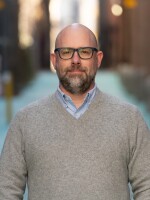This year’s honorees include a composer who wrote works that used human voices like instruments, a Kentucky priest who believes a God with human attributes connects humanity to the divine, sociologists who looked at how universities could serve students of color better, an Oxford University professor whose book puts the U.S. military on notice for its reliance on fossil fuels in the face of a changing climate and a psychologist who works in “ordinary magic.”
Winners received $100,000 and will visit Louisville in spring 2024 to present their ideas and receive their awards.
Here’s a full list of honorees:
Music Composition: Aleksandra Vrebalov
Serbian-American composer Aleksandra Vrebalov won for her composition “Missa Supratext.” The piece features a string quartet and girls choir in “nontraditional” choral work.
The English translation of the piece’s Latin title is “Mass Above Words.”
She wrote the piece for the San Francisco Girls Chorus and the Kronos Quartet. When conceptualizing the piece, Vrebalov was challenged to find a way to convey the feelings of Mass without using religion.
“So to find a way that would speak to me, and that I felt would be a work of art and not a liturgical piece of music I realized it would have to be something that transcends the the Western idea of what the Mass is and the language that comes with it,” Vrebalov told LPM News.
“Missa Supratext” features a chorus to convey sounds and syllables, rather than text from any actual language. Singers were told to make up words and say them in hushed tones. To mimic the sounds of the strings creating a call and response.
Ideas Improving World Order: Neta Crawford
University of Oxford professor Neta Crawford said if the U.S. is substantively addressing climate change, the nation’s military must reduce its reliance on fossil fuels.
“The United States military is the United States’ single largest energy user, and it is the single largest institutional emitter of greenhouse gasses in the world,” Crawford explained.
Her book “The Pentagon, Climate Change and War: Charting the Rise and Fall of Military Emissions” outlines her findings on the U.S.'s overwhelming negative contributions to the environment.
Crawford said the Pentagon needs to look at its own emissions at the level of worry it reviews outside threats with. She views winning the Grawemeyer as means to further that work.
“It's an occasion to talk with people about the importance of rethinking the legacy forces and installations the United States has that it doesn't necessarily need to keep,” Crawford told LPM. “It's a reason to explain how it is that military spending is correlated with emissions increases in countries that militarized their military emissions go up.”
Child psychologist Ann Masten has found resilience of human development is dependent on what she calls “ordinary magic.”
“As I studied children and families dealing with war, disasters, poverty, violence and homelessness, I found a consistent set of surprisingly ordinary but powerful factors at work,” she said in a news release about the award. “Resilience didn’t depend on special qualities but on a capacity to adapt that we develop over time as we are nurtured, learn and gain experience.”
She said factors like supportive relationships, a sense of belonging, self-control, problem-solving skills, optimism, motivation and a sense of purpose all go into creating “ordinary magic.”
And that these factors help explain what helps children facing adversity thrive while others don’t.
Her findings have helped to shape policy and practices in several fields and have been taught in more than 180 countries.
Education: Laura Hamilton and Kelly Nielsen
Two University of California sociologists looking into public colleges and universities can better serve students of color are the education award recipients.
In their book “Broke: The Racial Consequences of Underfunding Public Universities,” Laura Hamilton and Kelly Nielsen said years of cuts to public funding at public higher education institutions have hindered schools’ ability to give marginalized students a quality education.
“Public universities have faced decades of austerity and were hit hard by COVID-19, but those primarily serving marginalized students are being literally starved for resources,” Hamilton said in a news release about the award.
In their research, Hamilton and Nielsen found as schools were forced to move from government funding models to ones that relied on private donations, institutions serving marginalized students struggled the most.
An Episcopal priest from Lexington has won the religion award for his thoughts on God’s complexities presented in his book “A Human-Shaped God: Theology of an Embodied God.”
In it, he asserts that God can be upset, angry and jealous. That God can regret and learn.
Halton believes that seeing God as a deity with human qualities brings people closer to God.
“We are, like God, to move from a place of exclusion and anger-fueled violence to a life of inclusion, radical forgiveness and compassion,” he said in a news release about the award. “This is the path God is on. If we are not on it too, we are not imitating God.”
He gives examples from the Bible that show God’s capacity to be vengeful and not the all-loving entity God is often portrayed as. And uses those to show how people can use those stories to grow and improve as people.
“Many Bible accounts are springboards for theological imagination that help us see God in constructive ways,” he said in the release. “As humans, we too lash out in anger, but we also learn to forgive.”
Bill Burton contributed to this reporting.


